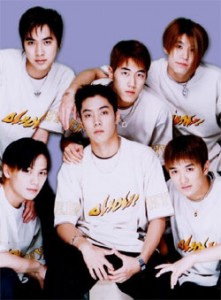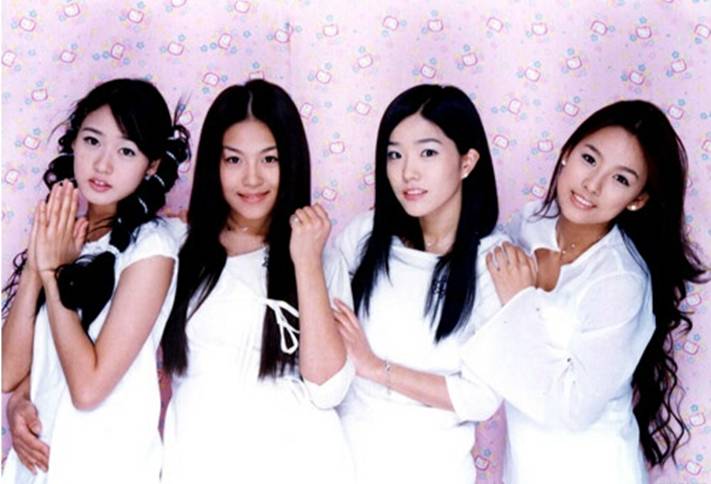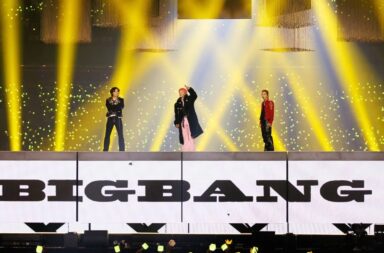 To open this bluntly, many new fans of K-pop associate DSP Media, formerly DSP Entertainment, only know the name for its connection to Kara, arguably the largest Korean girl group in Japan at the moment. What many fans these days fail to remember, however, is DSP’s rich history as an entertainment company. DSP was among the first entertainment companies to turn to the emerging idol industry of the time, consequently being fairly influential in shaping the K-pop genre as we know it today. They were key competitors from the get-go, creating some of the most successful idol acts of the period, and these acts eventually became part of the first generation of idols. DSP’s start as a K-pop company was glorious and grandiose, but in recent times, DSP Media’s reputation has seen a shift towards the middle-tier level in terms of entertainment companies. They’ve been placed in an awkward position among the Big 3, waiting in turn and hoping for jackpot jabs at the K-pop machine. As observed, this has not only been moderately successful, but also quite restricting. And to this I ask, what exactly happened to DSP?
To open this bluntly, many new fans of K-pop associate DSP Media, formerly DSP Entertainment, only know the name for its connection to Kara, arguably the largest Korean girl group in Japan at the moment. What many fans these days fail to remember, however, is DSP’s rich history as an entertainment company. DSP was among the first entertainment companies to turn to the emerging idol industry of the time, consequently being fairly influential in shaping the K-pop genre as we know it today. They were key competitors from the get-go, creating some of the most successful idol acts of the period, and these acts eventually became part of the first generation of idols. DSP’s start as a K-pop company was glorious and grandiose, but in recent times, DSP Media’s reputation has seen a shift towards the middle-tier level in terms of entertainment companies. They’ve been placed in an awkward position among the Big 3, waiting in turn and hoping for jackpot jabs at the K-pop machine. As observed, this has not only been moderately successful, but also quite restricting. And to this I ask, what exactly happened to DSP?
Before we describe DSP’s decline, let’s establish their history first. DSP, originally called DaeSung Enterprise, first found its roots as an entertainment company in 1991 after being founded by Lee Ho-yeon.  As DaeSung Enterprise, the company was responsible for creating the music group Firetruck, a group that is still fairly beloved by an older generation of Koreans to this day. It wasn’t until 1997 that DSP would make their entrance in the emerging K-pop scene, and what an entrance it was.
As DaeSung Enterprise, the company was responsible for creating the music group Firetruck, a group that is still fairly beloved by an older generation of Koreans to this day. It wasn’t until 1997 that DSP would make their entrance in the emerging K-pop scene, and what an entrance it was.
In 1997, DSP debuted their first idol group, being the boy group Sechs Kies. A year following, DSP debuted their first girl group, Fin.K.L. As most old-school K-pop fans (or fans of Answer Me 1997) would know, these two groups became very popular among the Korean youth, helping start the whole idol trend that would soon flourish. It was actually in 1999, when both idol groups were thriving that DSP first adopted its name as DSP Entertainment in reaction to the high success of the acts in their label. Sechs Kies and Fin.K.L. were actually considered the biggest competitors to — the now huge — SM Entertainment‘s ruling idol groups of the time, H.O.T. and S.E.S. respectively. But while SM Entertainment was able to pick up quite a bit of momentum following their first attempts at idol groups, DSP slowed down somewhat following the disbandment of their first groups.
Sechs Kies disbanded in 2000 after three years of idoldom and while Fin.K.L. hasn’t officially disbanded to this day, their promotions stopped in 2002, only ever regrouping to release a digital single in 2005. Between these years, DSP only debuted one group, Click B. While Click B’s music was fairly new and fresh at the time, their success was only decent, paling in comparison to their seniors. At this point, DSP experienced a period with minimal activity and minimal profit, staying in hiatus for the majority of this period.
 It wasn’t until 2005 did DSP start picking itself back up through the debut of popular group SS501. The group and its members experienced a surge of popularity comparable to the interest first shown towards their seniors. Two years later, DSP’s now flagship group Kara debuted, and despite the lukewarm reaction to their debut, the group has grown to become one of the bigger names in K-pop. Around the same time, in 2008, DSP made another boy group attempt with A’st1. However, meeting little success, they were disbanded, and quickly filled in with a new girl group in 2009, Rainbow.
It wasn’t until 2005 did DSP start picking itself back up through the debut of popular group SS501. The group and its members experienced a surge of popularity comparable to the interest first shown towards their seniors. Two years later, DSP’s now flagship group Kara debuted, and despite the lukewarm reaction to their debut, the group has grown to become one of the bigger names in K-pop. Around the same time, in 2008, DSP made another boy group attempt with A’st1. However, meeting little success, they were disbanded, and quickly filled in with a new girl group in 2009, Rainbow.
Just when things started looking up for DSP, crisis hit when SS501 decided to leave the company, leaving Kara as the only real source of income; Rainbow was lacking in profit due to their lackluster start. Things only got worse when some of the girls in Kara took legal action against DSP in 2011, requesting to have their contracts terminated, thus threatening to tear the group — the company’s main moneymaker — in two. As described by Johnelle in our Exchange on Kara, on a move of utter desperation, DSP agreed to the terms asked by the girls, keeping the group — their sole bread winner after SS501’s departure — in tact.
 As of now, DSP’s situation hasn’t improved despite debuting another boy group A-JAX and a girl group Puretty in Japan. Kara’s still the company’s only real moneymaker at the moment, since DSP still can’t take advantage of Rainbow despite them being active for three years now. And if DSP chooses to follow-up with the the tactics they’ve been employing, I really don’t see the company’s status improving either. There are clear and blatant flaws in DSP’s current route of promoting, flaws that will keep the company from returning to their previous levels of success, if that’s even possible at all.
As of now, DSP’s situation hasn’t improved despite debuting another boy group A-JAX and a girl group Puretty in Japan. Kara’s still the company’s only real moneymaker at the moment, since DSP still can’t take advantage of Rainbow despite them being active for three years now. And if DSP chooses to follow-up with the the tactics they’ve been employing, I really don’t see the company’s status improving either. There are clear and blatant flaws in DSP’s current route of promoting, flaws that will keep the company from returning to their previous levels of success, if that’s even possible at all.
The first is the company’s sudden focus on debuting new groups. This is likely a result of the company’s realization of how dependent they have been on a single act, an act that surely won’t last forever. The act in question is of course Kara, and their lawsuit brought much inspiration for today’s discussion. While new debuts could technically help DSP, with regard to longevity, I’m not entirely sure it’s a proper time for DSP to focus on new groups. Due to a good amount of the company’s resources going into funding and promoting these groups’ debuts, the remainder of DSP’s artistes — with their moneymaker acts being exceptions — stay largely neglected.
Rainbow’s been out of the K-pop scene for a while now, and member Woori even shed tears when discussing her group’s lack of activity. Sure, Rainbow didn’t have the best of beginnings, and their success to this point can be considered decent at best.  But considering the non-shabby material they were given, this group has had the potential to bag profits for DSP. Rather than spend a good amount of money on starting a new group, the notion of quality over quantity rings louder than ever. DSP would do well to expand on their current assets and allow for better returns from grooming Rainbow. Moreover, if DSP’s attempts with Rainbow proved to be largely unacceptable, who says these new groups would fare better? While their debut was decent, A-JAX hasn’t been able to retain their share of the spotlight, and Puretty’s fate still remains largely unknown. Thus, I don’t find it unreasonable to call DSP’s attempts futile. If a little financial security seems so far out of reach, where is the point in all of this?
But considering the non-shabby material they were given, this group has had the potential to bag profits for DSP. Rather than spend a good amount of money on starting a new group, the notion of quality over quantity rings louder than ever. DSP would do well to expand on their current assets and allow for better returns from grooming Rainbow. Moreover, if DSP’s attempts with Rainbow proved to be largely unacceptable, who says these new groups would fare better? While their debut was decent, A-JAX hasn’t been able to retain their share of the spotlight, and Puretty’s fate still remains largely unknown. Thus, I don’t find it unreasonable to call DSP’s attempts futile. If a little financial security seems so far out of reach, where is the point in all of this?
Secondly, I find DSP’s focus on Japan rather counterproductive. Due to Kara’s unprecedented success in Japan, DSP has shifted much of their focus to Korea’s neighboring market. Rainbow was sent to the foreign market despite their lack of footing at home, A-JAX’s Korean and Japanese debuts were simultaneous, and Puretty’s Japanese debut even preceded their Korean debut. While again, on paper, this idea seemed to reflect a considerable number of dollar signs (from Japanese promotions, I’m inclined to think that a stronger establishment at home is vital in the route to tackling the larger, more diverse market that is Japan. In this vein, Rainbow comes into the picture again, with DSP cutting their home-ground growth short and shipping them off to Japan to start anew in a new and more competitive market. The seven-member group, having foregone their early momentum in Korea, has so far received the short end of the stick.
 While DSP Media had quite the reputable past, their status in the present is nothing to coo about. DSP’s decline was most likely due to their dependency on certain groups and their inability to secure longevity. They’ve been in the habit of putting all their resources into one or two groups, only to be left in huge predicaments as their artistes leave or disband. Their current tactics aren’t much improved, since they stunt growth in their groups. While their plans might seem reasonable, DSP should be prioritizing security and stability, two of which have remained constant weaknesses in the company’s entire survival as an entertainment company. As of now, DSP remains a middle-tier company, a shame considering their potent past.
While DSP Media had quite the reputable past, their status in the present is nothing to coo about. DSP’s decline was most likely due to their dependency on certain groups and their inability to secure longevity. They’ve been in the habit of putting all their resources into one or two groups, only to be left in huge predicaments as their artistes leave or disband. Their current tactics aren’t much improved, since they stunt growth in their groups. While their plans might seem reasonable, DSP should be prioritizing security and stability, two of which have remained constant weaknesses in the company’s entire survival as an entertainment company. As of now, DSP remains a middle-tier company, a shame considering their potent past.
Nevertheless, despite their decline and shortcomings, DSP should still be applauded for giving birth to some of K-pop’s legendary figures — from Lee Hyori to Eun Ji-won, to Kim Hyun-joong to Kara. As a closing thought, even some of the most influential companies can face a massive decline as the years go by, meaning K-pop could see another major change in power. Deducing from DSP’s displacement, even the Big 3 could lose their hold on K-pop if they fail to secure longevity, unseating the industry’s rulers as we know them to be.
What do you Seoulmates think? Any comments on DSP’s past, present, or future? Do you think K-pop will see another change in power once again?
(DSP Media, kpopsurf, SBS, TVDaily, Naver, Nate [1] [2], Newsen)



